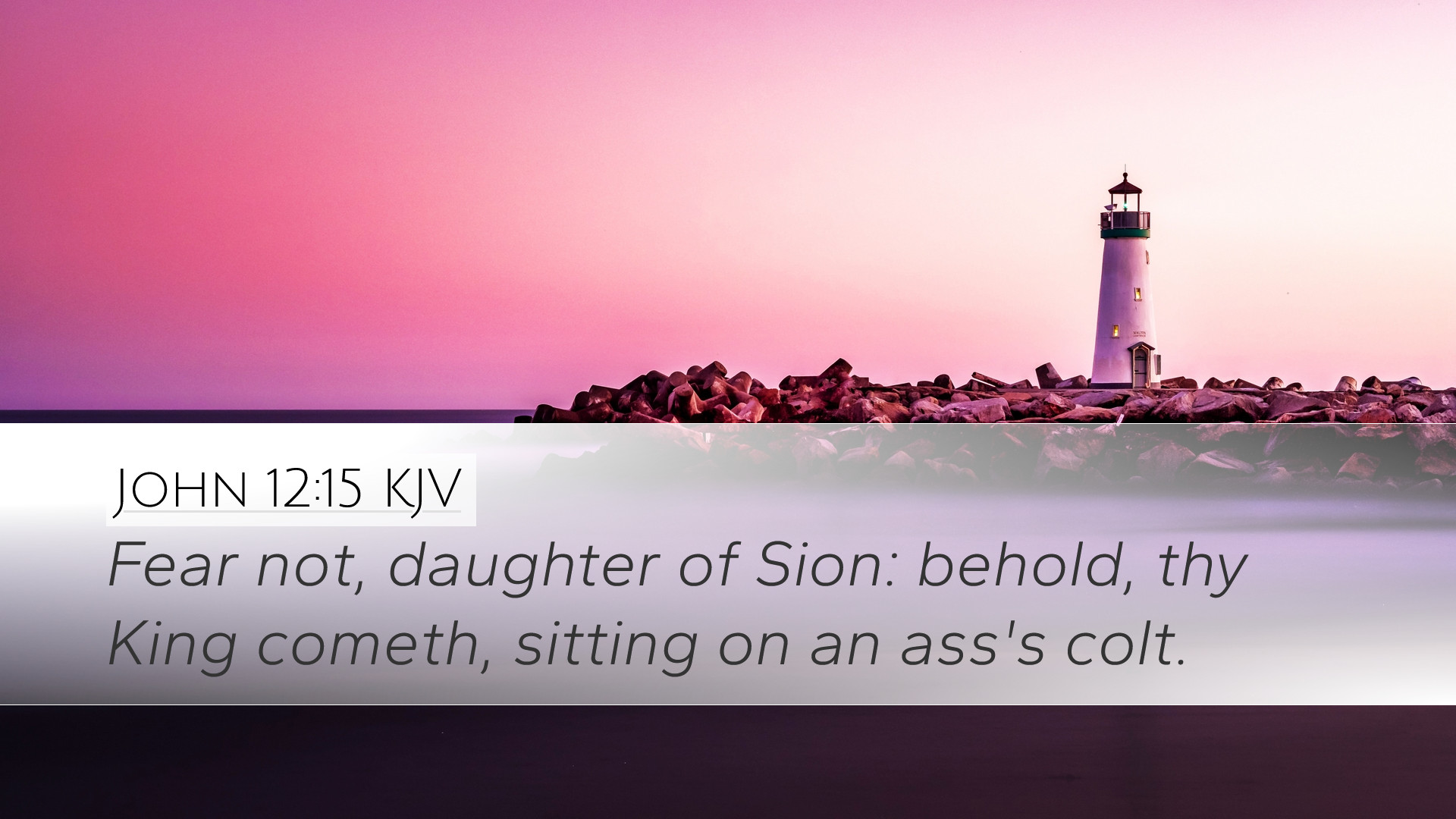Commentary on John 12:15
Text of John 12:15 (KJV): "Fear not, daughter of Sion: behold, thy King cometh, sitting on an ass's colt."
This verse is a momentous proclamation found in the narrative of Jesus’ triumphant entry into Jerusalem. It captures a fulfillment of prophecy and highlights the nature of Christ's kingship. Various public domain commentaries provide rich insights into this significant passage. Below is an integration of perspectives from noted commentators such as Matthew Henry, Albert Barnes, and Adam Clarke.
Contextual Background
Understanding John 12:15 necessitates a grasp of its immediate and broader context. This event takes place just before the Passion Week where Jesus arrives in Jerusalem, a series of events culminating in His crucifixion and resurrection. The Gospel accounts collectively reflect on the significance of Jesus’ entry and the expectations of the people.
Prophetic Fulfillment
Matthew Henry remarks on the connection to Old Testament prophecy, notably Zechariah 9:9, where it is foretold that the King would come humble and riding on a donkey. This serves as both a moment of triumph and humility—a paradox at the heart of Christ's mission. The act of riding a donkey rather than a war horse indicates a peaceful reign rather than a militaristic conquest.
Insights from Henry
- Fulfillment of Prophecy: Henry emphasizes that this event is a clear fulfillment of Messianic expectation, enabling the faith of the disciples and encouraging believers to recognize Jesus as the promised Messiah.
- Symbolism of the Donkey: The donkey, a humble animal, symbolizes peace. While a conquering king would typically enter on a horse, Jesus’ choice underscores His mission to bring peace and reconciliation.
- Reversal of Expectations: The crowd's expectations of a political liberator are challenged as Jesus presents a different kind of kingdom, one rooted in spiritual renewal rather than political power.
The Response of the Crowd
Albert Barnes notes the heart of the people responding to Jesus’ presence with excitement and joy. Their cry of "Hosanna" reflects their messianic hope and the expectation for deliverance from Roman oppression. Barnes presents the crowd’s actions as spontaneous worship, which is both a recognition of Jesus’ authority and a foreshadowing of their later abandonment.
Insights from Barnes
- Joyful Acclamation: Barnes highlights the significance of the people's joy and the wave of enthusiasm surrounding Jesus. Their cries signify genuine recognition of Jesus as King, albeit clouded by misunderstanding.
- Political Misunderstandings: He warns of the political and social implications of the crowd's expectations. Their hopes will soon sour as they realize Jesus' kingdom is not of this world.
- Temporary Nature of the Acclaim: Barnes points out the transient nature of public response. The same crowd that declared Him King will soon turn against Him, illustrating the fickleness of human allegiance.
Understanding Kingship
Adam Clarke offers a detailed examination of the title "King." He argues that the entry signifies not only a declaration of kingship but also reveals the nature of Jesus' reign. Clarke emphasizes that Jesus' kingdom is defined by humility and service rather than domination and oppression.
Insights from Clarke
- Nature of Jesus’ Kingship: Clarke points out that Jesus’ style of kingship is a radical departure from worldly norms. His authority is exercised through love, sacrifice, and service rather than force.
- Call to His Followers: He reflects on the implications for Christians today, suggesting that they are called to emulate Christ's humility and serve others rather than seek worldly power.
- Hope for Humanity: Clarke reassures that in Christ’s coming, there is hope—a hope not merely for Israel but for all humanity, thus expanding the significance of this event beyond the immediate audience.
Theological Implications
This verse serves as a profound theological cornerstone, giving insight into:
- The Nature of Christ: The dual themes of majesty and humility are brought to the forefront, allowing a deeper understanding of who Christ is within the Trinity.
- Understanding Salvation: It highlights the nature of Jesus’ mission—He comes not just to save but to inaugurate a new kind of kingdom grounded in love and reconciliation.
- Continuity of Scripture: It emphasizes the cohesive narrative of Scripture, confirming the prophetic voices of the Old Testament with the reality of New Testament events.
- Church Mission: The response of the crowd can be a reflective lens for the church, reminding it to consider how it represents Christ's kingdom in today's context.
Conclusion
In conclusion, John 12:15 is a rich, multilayered passage that offers significant insight into the character and mission of Jesus Christ. Through the contributions of noted commentators, we see a profound encouragement for believers to embrace Christ's model of kingship and his call to humility and service. This verse is an invitation for all—pastors, students, theologians, and scholars—to delve deeper into understanding the full scope of Christ’s mission and the implications for life and faith today.


